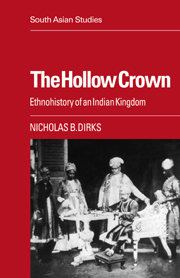Book contents
- Frontmatter
- Contents
- List of illustrations
- List of maps
- List of tables
- Preface
- Glossary of terms
- Map 1 Madras Presidency, 1900
- Map 2 Pudukkottai State
- The Tondaiman line of Pudukkottai
- PART 1 INTRODUCTION
- 1 The study of state and society in India
- PART 2 HISTORY AND ETHNOHISTORY
- PART 3 A LITTLE KINGDOM IN THE OLD REGIME
- PART 4 SOCIAL RELATIONS OF A LITTLE KINGDOM
- PART 5 COLONIAL MEDIATIONS: CONTRADICTIONS UNDER THE RAJ
- PART 6 CONCLUSION
- Appendix: Land and privilege: inams in Pudukkottai
- References
- List of records and abbreviations
- List of archives and record offices
- Index
- CAMBRIDGE SOUTH ASIAN STUDIES
1 - The study of state and society in India
from PART 1 - INTRODUCTION
Published online by Cambridge University Press: 25 October 2009
- Frontmatter
- Contents
- List of illustrations
- List of maps
- List of tables
- Preface
- Glossary of terms
- Map 1 Madras Presidency, 1900
- Map 2 Pudukkottai State
- The Tondaiman line of Pudukkottai
- PART 1 INTRODUCTION
- 1 The study of state and society in India
- PART 2 HISTORY AND ETHNOHISTORY
- PART 3 A LITTLE KINGDOM IN THE OLD REGIME
- PART 4 SOCIAL RELATIONS OF A LITTLE KINGDOM
- PART 5 COLONIAL MEDIATIONS: CONTRADICTIONS UNDER THE RAJ
- PART 6 CONCLUSION
- Appendix: Land and privilege: inams in Pudukkottai
- References
- List of records and abbreviations
- List of archives and record offices
- Index
- CAMBRIDGE SOUTH ASIAN STUDIES
Summary
The legacy
The Indian state is barely visible to comparative sociology. When the state is evident at all it appears as a weak form of Oriental despotism, destined to disappear as suddenly, and as casually, as it emerged. It seldom possesses mechanisms – hydraulic or otherwise – that could enable it to sustain itself for long. It depends mostly on ruthless shortsighted taxation of the countryside, which eventually leads to such chaos that it dissolves on its own or is conquered by some new entrant on the political scene.
Weber, Marx, Maine, and more recently Dumont have all held that in India, in marked contrast to China, the state was epiphenomenal. Marx's view is typical: “Just as Italy has, from time to time, been compressed by the conqueror's sword into different national masses, so do we find Hindustan, when not under the pressure of the Mohammedan, or the Mogul, or the Briton, dissolved into as many independent and conflicting States as it numbered towns, or even villages” (1972,35). Marx saw these village communities as the necessary complement of Oriental despotism: “these idyllic village communities, inoffensive though they may appear, had always been the solid foundation of Oriental despotism, that they restrained the human mind within the smallest possible compass, making it the unresisting tool of superstition, enslaving it beneath traditional rules, depriving it of all grandeur and historical energies” (p. 40). While states came and went, village communities endured.
For sociology, caste, not the state, held these village communities together.
- Type
- Chapter
- Information
- The Hollow CrownEthnohistory of an Indian Kingdom, pp. 3 - 16Publisher: Cambridge University PressPrint publication year: 1988



